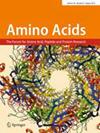Nanoparticles generated from a tryptophan derivative: physical characterization and anti-cancer drug delivery
Abstract
Surging reports of peptide-based nanosystems and their growing potency in terms of biological utility demand for the search of newer and simpler peptide-based systems that could serve as smart templates for the development of self-assembled nanostructures. Use of simple amino acids as monomeric building blocks for synthesizing ensembles of nanostructures have gained momentum in this direction with some reports focusing on the development of nanosystems from single or modified single amino acids. In this work, we have demonstrated self-assembly and nanoparticle formation ability of a single amino acid derivative, N-alpha-(9-fluorenylmethyloxycarbonyl)-N(in)-tert-butyloxycarbonyl-l-tryptophan [Fmoc-Trp(Boc)-OH]. The nanoparticles formed by the amino acid were found to be stable to various environmental perturbations like temperature, salts and showed responsiveness to pH change. These were capable of loading and releasing different bioactive molecules and were biocompatible. These systems demonstrated high cellular uptake and doxorubicin-loaded nanoparticles were found to be more efficient in killing glioma cells as compared to the drug alone. Thus, their simple amino acid-based origin along with the ability to ferry bioactive molecules to various cells, endows them the suitability for future applications in the field of drug delivery.





